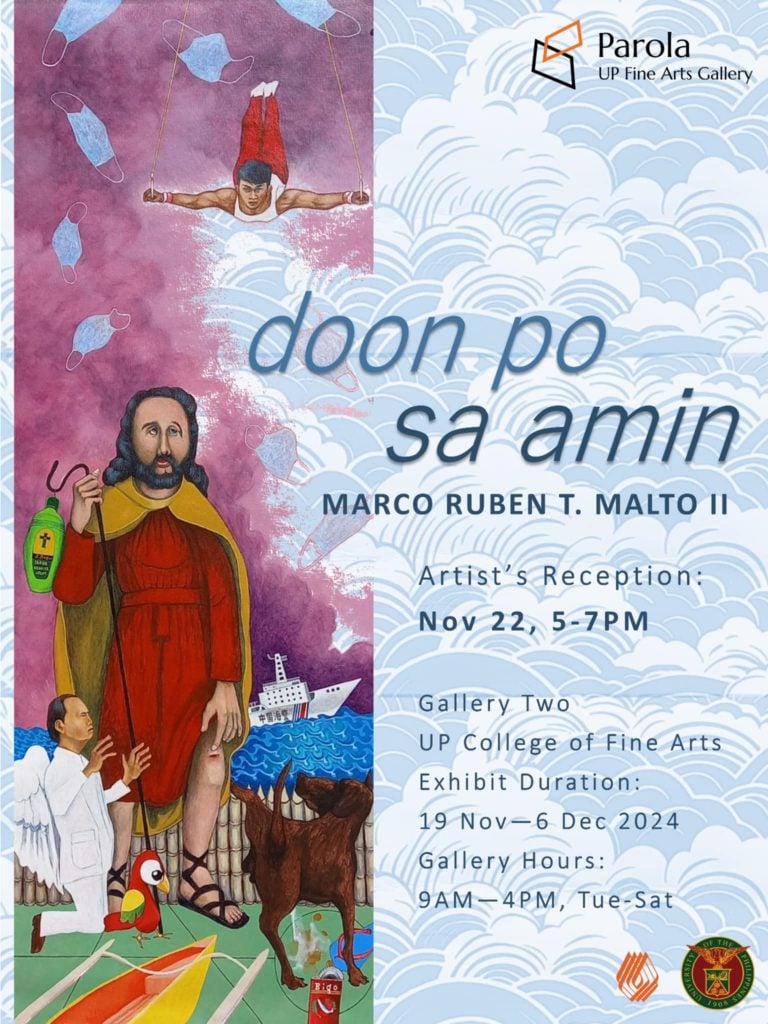
- This event has passed.
“Doon po sa amin” Marco Ruben T. Malto II Art Exhibit
November 19 @ 9:00 am - December 6 @ 4:00 pm

Filipino gymnast Carlos Yulo’s twin gold medal-win in the 2024 Paris Olympics will long be remembered as a historic feat for the Philippines. But what was a truly magical moment for a hard-earned victory quickly turned into an emotional trigger to a deep cultural divide, in a society where social media has the power to polarize people.
Hyperactive netizens, at first glued to the curious case of Alice Guo and her links to illegal Philippine Offshore Gambling Operations or POGOs, shifted their short attention span to the Yulo Family saga and found themselves torn between euphoria and disappointment. Once national obsession over the new golden boy’s family drama waned, the spotlight turned to Vice President Sara being a “shining example of a bad public servant” amid the deepening political rift between Marcos and Duterte. A fanfare of arrests also took the limelight– those of fake Filipino Guō Huápíng and her cohorts, and the fake “son of god” Apollo Quiboloy and his “angels of death”. Massive manhunts for the country’s most wanted criminals and their coddlers kept most Filipinos on alert, and distracted from their own adversities.
For months on end, media feeds feasted on the evasive POGO fugitives Alice Guo and Harry Roque, Quiboloy’s sex crimes, VP Sara on “Duterte mode”, and the looming International Criminal Court arrest of her father Digong and their allies for extrajudicial killings. But just as incessant and infuriating in the news are the Chinese forces and their monstrous vessels ramming the Philippine Coast Guard and threatening local fishers with their intrusive patrolling in the Philippine waters.
Whereas news followers fought over binge-worthy livestreamed Senate and House committee hearings, Filipinos are united in taking a stand against China’s illegal activities in the West Philippine Sea (WPS) — even when the previous “popular” administration went the unpopular route. Former President Rodrigo Duterte downplayed Philippine’s victory in a 2016 ruling by an international tribunal at the Hague, refuting Beijing’s extensive claims of sovereignty and historic rights over the WPS. Seeking economic benefits from China while loosening ties with the U.S., Duterte’s China-friendly stance was just one of his bloody regime’s endless list of epic failures. China’s bullying did not stop, while their high-interest loans and defective infrastructure projects continue to drown Filipino taxpayers in debts until today. In place of promised economic gains, transnational thugs operating gambling hubs as front for financial frauds, human and drug trafficking, and money laundering thrived to abuse thousands of desperate jobseekers in the region.
Nearly three years into office, President Bongbong Marcos still fails to bring down the price of rice to P20 per kilo, as he bans POGOs and commits to de-escalate tensions in the WPS by strengthening strategic alliance with the U.S.; prompting China’s intensified hostilities against the Philippine vessels. The escalating maritime dispute between the Philippines and China goes back to the geopolitical competition between Beijing and Washington, with the Filipinos on the receiving end of Chinese harassment.
International affairs paint a ruthless world as geopolitical tensions and armed conflicts continue to intensify, taking thousands of lives and affecting millions more. The Philippine Navy logging the largest presence of Chinese ships in WPS to date, along with China’s military moves in the region, makes the Philippines a constant target. As the nation fights for its rightful territories, resources and livelihoods amid false narratives in this AI age of deepfake, political polarization due to disunity in the UniTeam further deters the country’s economic progress. And as influencers, traditional politicians and dynasties dominate the battle for next year’s national and local elections, poor Filipinos become poorer, suffering from worsening living conditions and deadlier environmental disasters due to power struggles and human greed.
UP professor and painter Marco Ruben T. Malto II offers his yearly recap of the country’s big events through his solo art exhibition titled, “Doon Po Sa Amin”. Malto’s narrative art comments on current socio-political conditions while remembering history, as he explores cultural references from thematic beliefs and practices that are distinctly Filipino. Doon Po Sa Amin is open for viewing at Gallery Two, Art & Design West Hall at UP Diliman’s College of Fine Arts from Nov 19- Dec 6, 2024. Gallery hours are from 9AM-4PM, Tue-Sat. The public is invited to the Artist’s Reception on Nov. 22, Fri, 5PM.
About the Artist:
Marco Ruben T. Malto II (b. 1972, Manila) is a graduate of University of the Philippines Diliman-College of Fine Arts (UPCFA) completing his Bachelor of Fine Arts Major in Painting degree in 1993, and his Master of Fine Arts degree in 2002.
For more than a decade, Malto’s annual solo exhibitions embody themes capturing the country’s current concerns and how they interplay with Philippine history and cultural nuances. The history enthusiast in the artist chronicles, as the professor educates by engaging his public in important national discourses through his art exhibits.
Malto has been teaching at UPCFA-Department of Studio Arts since 2002, and has been a recipient of the University Artist Award (for cycles 2018-2020 & 2021-2023), and the UP Diliman Centennial Professorial Chair Award for his annual solo exhibits from 2012 to 2023: Colors of Black, 2012; Bayang Magiting, 2013; Siete Estaciones, 2014; Ang Petroglyphs ng Angono, 2015; Susmaryosep!, 2016; Peksman!, 2017; Kahimanawari, 2018; Kalendaryo 20/20, 2019; Faith, Hope and Charity: Conquest of the Philippines, 2021; Sulat: Retelling Rizal through Philately, 2022; and Bisa, 2023.
